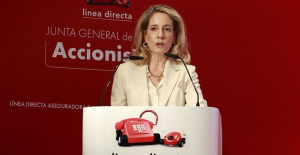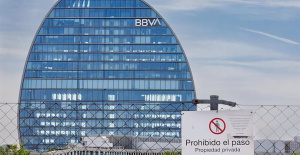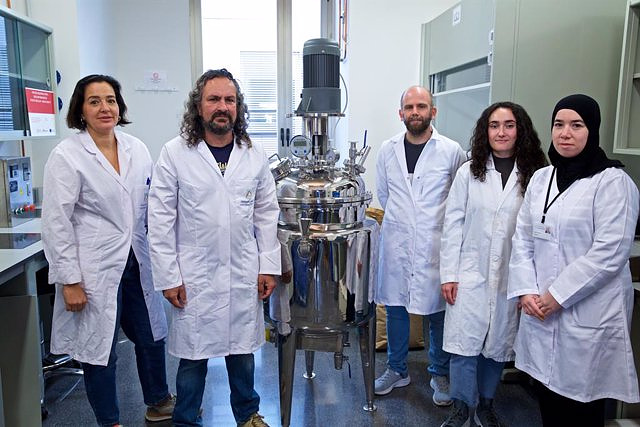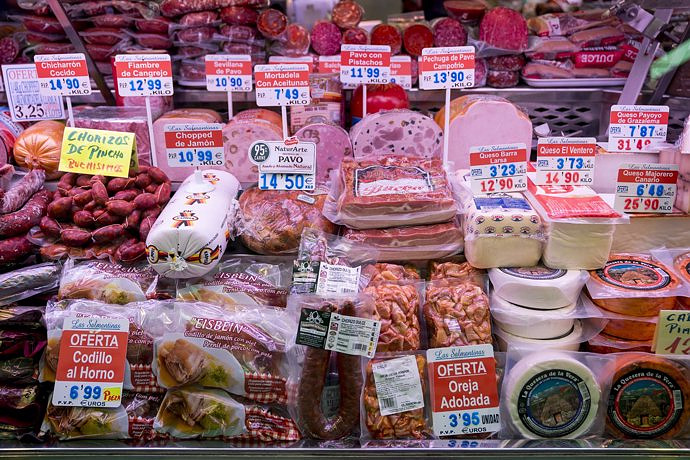ALICANTE, 8 Ene. (EUROPE PRESS) -
The University of Alicante (UA) has a pilot plant for the decontamination of recycled plastic located in the laboratories of the Engineering for the Circular Economy (I4EC) research group, since one of the challenges of the recycling industry is to generate new technologies capable of eliminating all types of contaminants and thus being able to meet the demand for high-quality recycled plastic.
The professor in Chemical Engineering at the UA and person responsible for the project, Andrés Fullana, explained in a statement that companies need recycled plastic of similar quality to virgin plastic to implement it in their processes.
"Thanks to this pilot plant, we will be able to contribute to obtaining high-quality plastic for such important applications as food packaging, toys, household products and pharmaceuticals," he emphasized.
Currently, conventional recycling processes produce "low quality" recycled plastics that cannot be used for human consumption products and are only used in low added value applications, such as garbage bags, pipes or flower pots, which represent between 20- 25 percent of the plastic products market.
On the other hand, these recycling processes are not capable of eliminating all contaminants, since most use water, detergents and soda to wash the plastic. "With these washes, only contaminants or impurities can be removed from the surface. However, the process developed by the UA is based on a special type of solvents with a high atomic weight and soluble in water and on a specific already patented process that solves the problem," said the UA researcher.
The main contributions of this technology is that it improves the quality of recycled plastics, removing the solvent from the plastic easily by washing with water. With this process "barely a small solid waste is generated from the water treatment, but nothing is poured into the air." In addition, it allows working at atmospheric pressure, an aspect that "increases the safety of the process and reduces investment and operation costs."
The UA pilot plant project to decontaminate recycled plastic, lasting three years, has obtained more than 410,000 euros from the Agència Valenciana de la Innovació (AVI) of the Generalitat Valenciana, in the aid program for the recovery and transfer of research results to companies 2023, financed by the European Union within the framework of the European Regional Development Fund Program (ERDF) Comunitat Valenciana 2021-2027.
The Technological Institute of Children's Products and Leisure (AIJU) and the Institute of Packaging Technology, Transport and Logistics (ITENE) collaborate, which will carry out the validation of decontaminated plastic in products from the toy and packaging sector.
The AU has pointed out that each year more than 27 million tons of plastic waste are produced in Europe, of which only 31% are recycled, 42% are incinerated due to their low quality and the rest are sent to landfills.
"If we consider that we can increase recovery for recycling by 10% of the plastic that is currently destined for incineration, the market volume in Europe alone would be about 500 million euros annually," Fullana highlighted.
The new waste laws focus on the mandatory use of a percentage of recycled material in packaging. In the case of the European Union, 25% will be mandatory in the case of PET by 2025 and 30% for the rest of the materials in 2030.
In this regard, Fullana has indicated that the problem is that "currently there is not enough recycled plastic on the market with the necessary quality to cover this demand." "It is necessary to develop a technology that allows this recycled material to achieve 'food contact grade' quality suitable for being in contact with food," he stressed.
With this new challenge, the UA contributes to the increase in demand for recycled plastic, in addition to reducing the dumping of plastic waste and environmental pollution. "A greater consumption of recycled plastic translates into a decrease in the consumption of virgin plastic that is manufactured with natural resources and which entails a much greater energy expenditure than the recycling process," highlighted the researcher.
If not managed correctly, plastic waste produces negative effects on both the environment and people's health, for example, due to the production of microplastics that can be consumed, due to different additives that are dangerous to health such as bisphenol A. or even for contaminating beaches or natural spaces.
"By removing contaminants, you increase the safety of consumers of products that contain recycled plastics, for example, children who use toys, personal hygiene product packaging or food packaging if authorization is obtained for materials in contact with food," stressed the UA professor.

 Exploring Cardano: Inner Workings and Advantages of this Cryptocurrency
Exploring Cardano: Inner Workings and Advantages of this Cryptocurrency Seville.- Economy.- Innova.- STSA inaugurates its new painting and sealing hangar in San Pablo, for 18 million
Seville.- Economy.- Innova.- STSA inaugurates its new painting and sealing hangar in San Pablo, for 18 million Innova.- More than 300 volunteers join the Andalucía Compromiso Digital network in one month to facilitate access to ICT
Innova.- More than 300 volunteers join the Andalucía Compromiso Digital network in one month to facilitate access to ICT Innova.-AMP.- Ayesa acquires 51% of Sadiel, which will create new technological engineering products and expand markets
Innova.-AMP.- Ayesa acquires 51% of Sadiel, which will create new technological engineering products and expand markets The CNMV once again suspends Applus's listing
The CNMV once again suspends Applus's listing Línea Directa earns 10.1 million euros in the first quarter, compared to losses of 5.3 million
Línea Directa earns 10.1 million euros in the first quarter, compared to losses of 5.3 million Unicaja triples its profit in the first quarter, up to 111 million euros
Unicaja triples its profit in the first quarter, up to 111 million euros BBVA earns 2,200 million in the first quarter, 19.1% more
BBVA earns 2,200 million in the first quarter, 19.1% more How Blockchain in being used to shape the future
How Blockchain in being used to shape the future Not just BTC and ETH: Here Are Some More Interesting Coins Worth Focusing on
Not just BTC and ETH: Here Are Some More Interesting Coins Worth Focusing on UPV students build a prototype of a wooden house to move to Equatorial Guinea
UPV students build a prototype of a wooden house to move to Equatorial Guinea The UA opens the call for the Impulso 2024 Awards for the best innovative business initiatives
The UA opens the call for the Impulso 2024 Awards for the best innovative business initiatives ALI, virtual assistant from Alicante, internationally recognized by the OECD
ALI, virtual assistant from Alicante, internationally recognized by the OECD Retrópolis brings the golden age of video games and computing to the UPV
Retrópolis brings the golden age of video games and computing to the UPV A million people demonstrate in France against Macron's pension reform
A million people demonstrate in France against Macron's pension reform Russia launches several missiles against "critical infrastructure" in the city of Zaporizhia
Russia launches several missiles against "critical infrastructure" in the city of Zaporizhia A "procession" remembers the dead of the Calabria shipwreck as bodies continue to wash up on the shore
A "procession" remembers the dead of the Calabria shipwreck as bodies continue to wash up on the shore Prison sentences handed down for three prominent Hong Kong pro-democracy activists
Prison sentences handed down for three prominent Hong Kong pro-democracy activists ETH continues to leave trading platforms, Ethereum balance on exchanges lowest in 3 years
ETH continues to leave trading platforms, Ethereum balance on exchanges lowest in 3 years Investors invest $450 million in Consensys, Ethereum incubator now valued at $7 billion
Investors invest $450 million in Consensys, Ethereum incubator now valued at $7 billion Alchemy Integrates Ethereum L2 Product Starknet to Enhance Web3 Scalability at a Price 100x Lower Than L1 Fees
Alchemy Integrates Ethereum L2 Product Starknet to Enhance Web3 Scalability at a Price 100x Lower Than L1 Fees Mining Report: Bitcoin's Electricity Consumption Declines by 25% in Q1 2022
Mining Report: Bitcoin's Electricity Consumption Declines by 25% in Q1 2022 Oil-to-Bitcoin Mining Firm Crusoe Energy Systems Raised $505 Million
Oil-to-Bitcoin Mining Firm Crusoe Energy Systems Raised $505 Million Microbt reveals the latest Bitcoin mining rigs -- Machines produce up to 126 TH/s with custom 5nm chip design
Microbt reveals the latest Bitcoin mining rigs -- Machines produce up to 126 TH/s with custom 5nm chip design Bitcoin's Mining Difficulty Hits a Lifetime High, With More Than 90% of BTC Supply Issued
Bitcoin's Mining Difficulty Hits a Lifetime High, With More Than 90% of BTC Supply Issued The Biggest Movers are Near, EOS, and RUNE during Friday's Selloff
The Biggest Movers are Near, EOS, and RUNE during Friday's Selloff Global Markets Spooked by a Hawkish Fed and Covid, Stocks and Crypto Gain After Musk Buys Twitter
Global Markets Spooked by a Hawkish Fed and Covid, Stocks and Crypto Gain After Musk Buys Twitter Bitso to offset carbon emissions from the Trading Platform's ERC20, ETH, and BTC Transactions
Bitso to offset carbon emissions from the Trading Platform's ERC20, ETH, and BTC Transactions Draftkings Announces 2022 College Hoops NFT Selection for March Madness
Draftkings Announces 2022 College Hoops NFT Selection for March Madness























